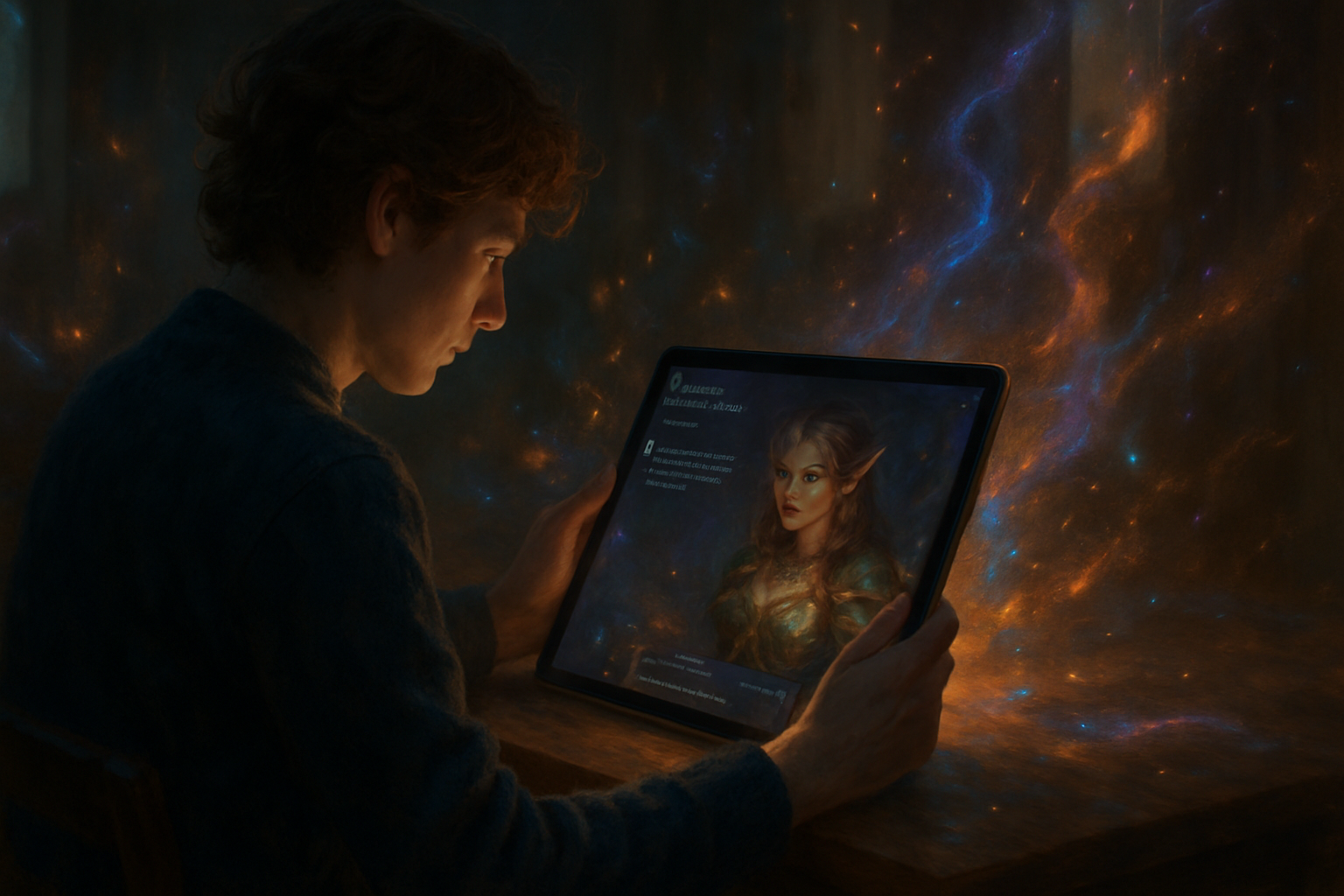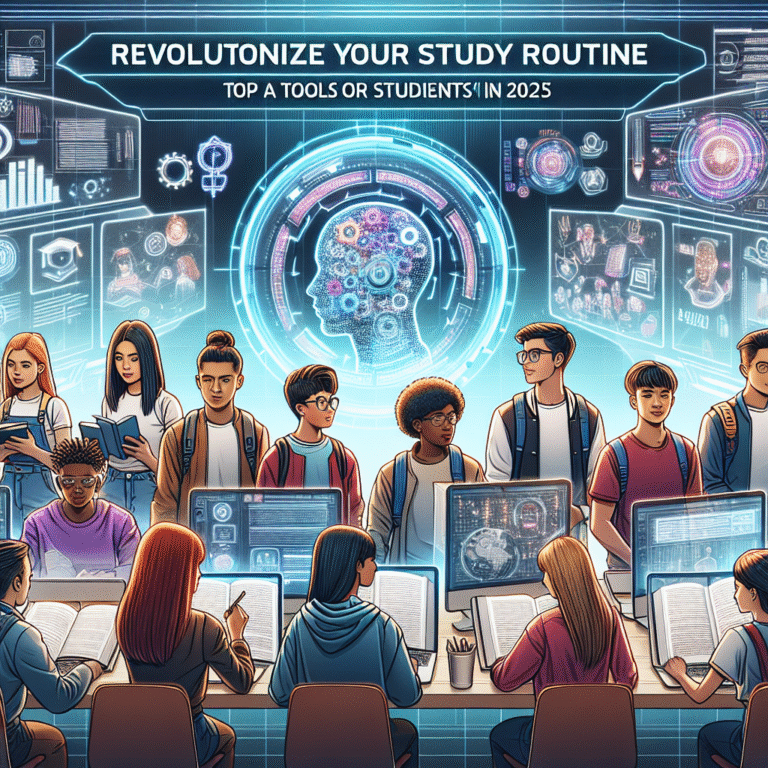Step into a realm where imagination knows no bounds, and stories unfold at your command. In 2025, fantasy AI roleplay apps are revolutionizing how we interact with narratives, offering immersive experiences that blend the thrill of traditional roleplaying with the cutting-edge capabilities of artificial intelligence. These advanced platforms allow users to craft intricate worlds, embody unique characters, and engage in dynamic, evolving storylines powered by intelligent chatbots. Whether you're a seasoned gamer, a budding writer, or simply a fan of fantastical tales, fantasy AI opens up new dimensions of creativity and engagement. This guide delves into the best fantasy AI tools available, explaining how they work and how you can harness their power to bring your wildest fantasies to life.
What is Fantasy AI?
Fantasy AI, in essence, refers to artificial intelligence systems designed to understand, generate, and participate in narratives set within fantasy genres. This can range from high fantasy epics filled with dragons and wizards to dark fantasy horror or whimsical fairy tales. At its core, fantasy AI leverages large language models (LLMs) trained on vast datasets of text, including novels, scripts, and dialogue, to produce contextually relevant and creative responses. The primary goal is to simulate an interactive experience where the AI acts as a Dungeon Master, a supporting character, or even the protagonist, adapting to user inputs and driving the story forward. It's an evolution of interactive fiction, where the story isn't pre-written but dynamically generated, making each roleplay with AI characters session unique.
Imagine a digital companion capable of weaving complex lore, inventing unexpected plot twists, and maintaining character consistency, all while reacting to your choices in real-time. This is the promise of fantasy AI, captivating gamers seeking endless adventures, writers battling creative blocks, and fans eager to dive deeper into beloved universes or create new ones.

How Fantasy AI Roleplay Chatbots Work
The magic behind fantasy AI roleplay chatbots lies in sophisticated algorithms and massive computational power. These chatbots utilize advanced LLMs, such as GPT variants, which are trained on enormous text corpora to learn patterns, grammar, and thematic elements of human language and storytelling. When you provide a prompt, the AI processes your input, analyzes the context, and generates a coherent, relevant, and creative response.
- Natural Language Processing (NLP): This allows the AI to understand your natural language commands and questions, interpreting your intent and the nuances of your chosen fantasy setting.
- Contextual Understanding: Unlike simpler chatbots, fantasy AI maintains context over long conversations, remembering character names, plot points, and world lore, ensuring continuity in the narrative.
- Generative Capabilities: The AI doesn't just retrieve pre-written responses; it generates new text on the fly, creating unique dialogue, descriptions, and plot developments tailored to your interaction. This is where the "story generator" aspect truly shines, turning prompts into vivid narratives.
- Parameter Customization: Many platforms allow users to define specific parameters for the AI, such as character personality traits, moral alignments, narrative style (e.g., grimdark, whimsical), and even censorship filters, enabling a highly personalized AI character.
This intricate interplay of technologies allows fantasy AI chatbots to mimic the collaborative storytelling experience of traditional roleplaying, adapting to user choices and generating dynamic narratives that can surprise and delight.
Best Fantasy AI Roleplay Tools
The landscape of fantasy AI tools is rapidly evolving, with several platforms standing out for their unique features and capabilities. Here are some of the best picks for 2025:
| Tool | Description | Pricing |
|---|---|---|
| KoboldAI | An open-source, local-first AI writing tool that offers a browser-based front-end for AI-assisted writing. It supports various local and remote AI models and provides extensive customization options for narrative control, memory, and world information. Ideal for users who prefer privacy and offline capabilities. | Primarily free for local use; community-driven with optional paid hosting/services. |
| NovelAI | A popular subscription-based service specializing in AI-assisted storywriting and text-to-image synthesis. Known for its advanced GPT-based LLMs and its ability to generate high-quality, anime-inspired images. Offers robust features for creative writing, including lorebooks and advanced AI settings. | Subscription-based (e.g., Tablet $10/mo, Scroll $15/mo, Opus $25/mo) with in-app currency (Anlas) for image generation. |
| Perchance | A versatile platform for creating custom text and image generators, including powerful fantasy AI character and story generators. It's highly customizable and allows users to share their creations or use existing community-made generators. Excellent for quick prototyping and unique character concepts. | Free to use, with no sign-up required for many generators. |
| Character AI | While not exclusively fantasy-focused, Character AI allows users to create and interact with highly customizable AI characters, including those from fantasy settings. Its strength lies in its ability to simulate diverse personalities and engage in dynamic conversations. | Free to use, with optional premium features or in-app purchases on some versions. |
| AI Dungeon | One of the pioneers in AI-driven interactive fiction, AI Dungeon offers open-ended text adventures where the AI generates the world and responds to player actions. It's known for its freedom and often unpredictable narrative paths. | Offers both free and paid tiers with more advanced AI models and features in premium subscriptions. |
Each tool offers a unique flavor of AI roleplay, catering to different preferences and needs, from deep narrative control to quick creative bursts.
How to Start Fantasy Roleplay with AI (Step-by-Step)
Getting started with fantasy AI roleplay is simpler than you might think. Follow these steps to embark on your first adventure:
- Choose Your Platform: Select an AI roleplay app that best suits your needs. Consider whether you prefer a web-based interface like NovelAI, a local installation like KoboldAI, or a free, versatile generator like Perchance.
- Define Your Scenario: Before you even type, envision the world you want to create. Are you a brave knight on a quest, a cunning rogue in a bustling city, or a powerful wizard exploring ancient ruins? The clearer your initial vision, the better the AI can align with your expectations.
- Craft Your Character: Most platforms allow you to define your character. Give them a name, a brief backstory, personality traits, and perhaps even physical descriptions. The more detail you provide, the more accurately the AI can interact with your persona.
- Provide the Initial Prompt: This is your starting point. Begin with a descriptive sentence or paragraph that sets the scene and introduces your character. For example: "I am Elara, a elven archer, venturing deep into the Whispering Woods, seeking the lost artifact of the Sunken King. The air is thick with ancient magic, and shadows dance amongst the towering trees."
- Engage and Interact: The AI will respond to your prompt. Read its response carefully and then input your next action or dialogue. Be specific and descriptive. Instead of just "I go," try "I cautiously approach the shimmering light in the distance, nocking an arrow to my bow."
- Guide and Refine: The AI learns from your inputs. If it veers off track, gently guide it back. You can often edit its responses or provide clarifying instructions like "Focus on the dragon's actions" or "Let's introduce a new character here."
- Experiment and Explore: Don't be afraid to try different scenarios, characters, and narrative styles. The beauty of AI companions lies in their adaptability and the endless possibilities they offer.
The key is to treat the AI as a collaborative partner, providing clear direction while allowing for surprising, emergent narratives.
Use Cases for Writers, Gamers, and Fans
Fantasy AI offers a myriad of applications beyond simple entertainment, proving invaluable for various creative pursuits:
- For Writers:
- Overcoming Writer's Block: An AI fantasy story generator can provide fresh ideas, plot twists, and character interactions when you're stuck.
- Worldbuilding: Collaborate with the AI to flesh out intricate fantasy worlds, develop detailed lore, and generate unique creatures, cultures, and magical systems.
- Character Development: Roleplay with your characters to understand their motivations, reactions, and dialogue patterns, making them feel more authentic.
- Dialogue Practice: Practice writing dialogue by interacting with AI characters, refining your conversational flow and character voices.
- For Gamers:
- Solo Adventures: Experience endless, personalized D&D-like campaigns without needing a Dungeon Master or other players.
- Modding and Content Creation: Generate custom quests, NPCs, and lore for existing games or your own game development projects.
- Roleplaying Practice: Hone your roleplaying skills by interacting with AI characters, preparing for tabletop sessions or online multiplayer games.
- For Fans:
- Fanfiction and AU Exploration: Explore "What If" scenarios or create alternative universes within your favorite fantasy franchises, interacting with AI versions of beloved characters.
- Immersive Escapism: Dive deep into rich fantasy worlds, enjoying personalized narratives that adapt to your every choice.
- Creative Outlet: For those who love fantasy but aren't traditional writers or artists, these tools offer an accessible way to engage with and create within the genre.

Fantasy AI Pricing – Free vs. Paid Apps
The world of fantasy AI roleplay offers a spectrum of pricing models, from completely free options to premium subscription services. Understanding the differences helps you choose the best fit for your budget and needs:
- Free Fantasy AI Apps:
- Accessibility: Many platforms, like Perchance (often used as a story generator) or the basic tiers of others, offer free access. They are great for casual users or those new to AI roleplay.
- Limitations: Free versions often come with limitations, such as caps on the number of messages per day, slower response times, fewer advanced features, or limited access to the most powerful AI models. Some may rely on an "Anlas" or "point" system that requires in-app purchases for extended use, as seen in some mobile apps.
- Open-Source: Tools like KoboldAI are open-source and free to run locally, offering extensive control for tech-savvy users willing to set them up.
- Paid Fantasy AI Apps:
- Enhanced Experience: Paid subscriptions typically unlock premium features, including access to larger, more sophisticated AI models, faster generation speeds, unlimited interactions, and often the ability to handle more complex or nuanced prompts.
- Higher Quality: Services like NovelAI demonstrate how paid models can deliver superior text coherence, narrative consistency, and impressive image generation capabilities.
- Exclusive Content/Features: Some paid apps offer exclusive character libraries, advanced customization tools, or specialized models for specific genres (e.g., NSFW options as seen in some spicy chat AI tools, though often with ethical considerations).
- Support and Development: Subscriptions help fund ongoing development, server costs, and customer support, ensuring a continually improving service.
For casual exploration, free options are excellent. For serious writers, dedicated gamers, or those seeking the highest quality and freedom, investing in a paid subscription is often worthwhile.
Fantasy AI vs. Traditional Roleplay Games
While fantasy AI shares the core concept of collaborative storytelling with traditional tabletop role-playing games (TTRPGs) like Dungeons & Dragons, there are distinct differences:
- Accessibility: AI roleplay is immediately accessible. No need to gather a group, schedule sessions, or find a Dungeon Master. You can play anytime, anywhere.
- Pacing: AI interactions are generally much faster, allowing for rapid narrative progression. There's no waiting for other players or the DM to formulate a response.
- Unpredictability: Both offer unpredictability, but AI's randomness can sometimes lead to bizarre or nonsensical outputs, whereas a human DM can always course-correct or interpret rules creatively. The AI Dungeon Wikipedia page provides more context on the early days of AI text adventures.
- Human Element: Traditional TTRPGs thrive on human interaction, improvisation, and the unique social dynamics of a group. AI, while advanced, cannot replicate the spontaneous creativity and emotional depth of human minds.
- Scope and Lore: AI can access vast amounts of data, allowing it to draw upon immense lore and details instantaneously. Human DMs, while creative, have limits to their immediate recall and processing speed.
- Customization: AI tools often allow for unparalleled customization of characters and scenarios, letting you dictate every detail of your imaginary world.
Ultimately, fantasy AI is not a replacement for traditional roleplaying but rather a complementary tool, offering a different, often more personal and immediate, way to engage with fantasy narratives.
Tips to Enhance Roleplay with AI Characters
To get the most out of your fantasy AI roleplay experience and create truly immersive stories, consider these tips:
- Be Descriptive: The more vivid details you provide about your actions, the environment, and your character's emotions, the better the AI can paint a picture and react appropriately.
- Use Clear and Concise Prompts: While descriptive, avoid overly long or ambiguous prompts. Break down complex actions into simpler steps if the AI struggles to understand.
- Maintain Consistency: Keep track of character names, locations, and important plot points. If the AI deviates, gently remind it of the established lore.
- Define Character Personalities: When creating or interacting with AI characters, clearly state their traits, motivations, and speaking style. This helps the AI stay in character. For more on this, check out our guide on how to make an AI character.
- Experiment with "Author's Notes" or System Commands: Many advanced platforms allow you to give direct instructions to the AI outside of the narrative, guiding its behavior or setting meta-rules for the story.
- Embrace the Unexpected: Sometimes the AI will generate bizarre or humorous responses. Learn to incorporate these unexpected elements into your story; they can often lead to delightful and memorable moments.
- Utilize Memory and World Info: If your chosen platform has "memory" or "world info" features, populate them with key details about your characters, lore, and locations. This helps the AI remember crucial context over long sessions.
- Review and Edit AI Responses: Don't be afraid to edit the AI's output to better fit your vision or correct inconsistencies before continuing the narrative.
Final Thoughts + Related AI Tools
Fantasy AI roleplay apps are not just a passing trend; they represent a significant leap forward in interactive storytelling and personal creative expression. They empower individuals to craft epic tales, explore imaginative worlds, and engage with dynamic characters in ways previously unimaginable without a dedicated group or elaborate setup. As AI technology continues to advance, we can expect these tools to become even more sophisticated, offering even richer, more seamless, and truly personalized fantasy adventures.
Beyond fantasy roleplay, AI tools are transforming various industries. For those interested in broader applications of AI, consider exploring:
- Best AI Tools for Product Teams in 2025
- Best AI Tools for Content, SEO, and Video in 2025
- AI Product Management Tools for 2025
- Zoom AI Companion Guide 2025
FAQ Section
What is the best fantasy AI tool?
The "best" fantasy AI tool depends on your specific needs. For open-source and local control, KoboldAI is excellent. For high-quality, subscription-based story and image generation, NovelAI is a top contender. Perchance is ideal for free, customizable character and story generators, while Character AI offers diverse character interactions. AI Dungeon is great for open-ended text adventures.
Are fantasy AI apps free?
Many fantasy AI apps offer free tiers or completely free usage, such as KoboldAI (for local use) and Perchance. However, free versions often come with limitations like message caps, slower responses, or fewer advanced features. Paid subscriptions typically unlock full capabilities, higher quality, and unlimited usage.
Can I create my own AI characters?
Yes, most advanced fantasy AI roleplay platforms, including NovelAI, Perchance, and Character AI, allow users to create and customize their own AI characters. You can define their appearance, personality traits, backstories, and even how they interact, allowing for highly personalized roleplay experiences. For a detailed guide, refer to our article on how to make an AI character.
Is fantasy AI safe for kids?
The safety of fantasy AI apps for kids varies by platform. Some apps are designed with content filters and age restrictions (e.g., Character AI has a 13+ or 16+ age requirement for certain regions). However, AI can sometimes generate unexpected or inappropriate content due to its generative nature. Parental supervision and choosing platforms with clear safety guidelines and content moderation are recommended for younger users.






